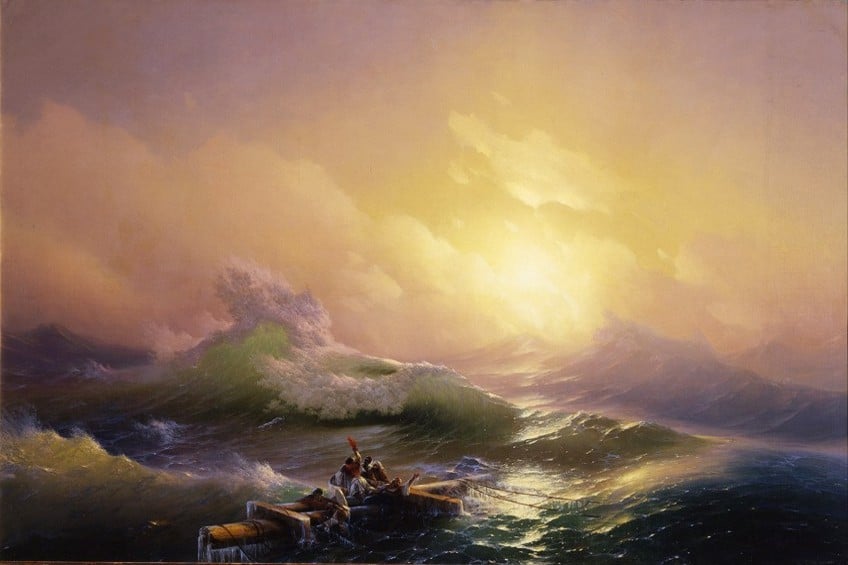Famous Ocean Paintings – Discover Iconic Paintings of the Sea
The sea has long been a focal point and source of motivation for many of history’s most famous artists, resulting in a rich heritage of famous ocean paintings. Rage, exhilaration, disaster, gentleness, and other characteristics are shared by many renowned paintings of the ocean. Many famous ocean painters have endeavored to depict the sea and how it responds to mankind’s many activities and choices. To explore the most renowned paintings of the sea, we have compiled a list of the most famous ocean artworks that caused waves across the art world.
The Most Famous Ocean Paintings
Representing the ocean in all of its unique grandeur is a challenging endeavor for many artists, but the most proficient ocean painters have discovered methods to depict the water and its soaring waves in a way that evokes as much fascination and wonder as any writer or other artistic individual can conceive.
Producing paintings of the ocean provided several obstacles in and of themselves.
Some painters have found it most difficult to capture peaceful, motionless waters and their reflective properties, while others have attempted to portray the ocean in all its roaring grandeur, with gigantic, deadly waves and turbulent winds. Whatever way the paintings of the sea are depicted, there is a tremendous level of competence in accurately depicting the ocean in its many distinct forms. Here are the most famous ocean artworks for you to enjoy.
The Storm on the Sea of Galilee (1633) by Rembrandt
| Artist | Rembrandt van Rijn (1606 – 1669) |
| Date of Completion | 1633 |
| Medium | Oil on canvas |
| Dimensions (cm) | 160 x 128 |
| Current Location | Stolen |
One of Rembrandt’s most renowned works was this artwork depicting Christ and his followers on a stormy ocean. The picture makes excellent use of chiaroscuro to convey both optimism and approaching disaster. A wonderful illustration of the artist’s approach is the storm and the disciples’ attempts to steer the boat.
One of the most striking parts of this picture is its representation of Jesus calming a storm. He does it by pointing upward to the skies, which he believes is the source of light.
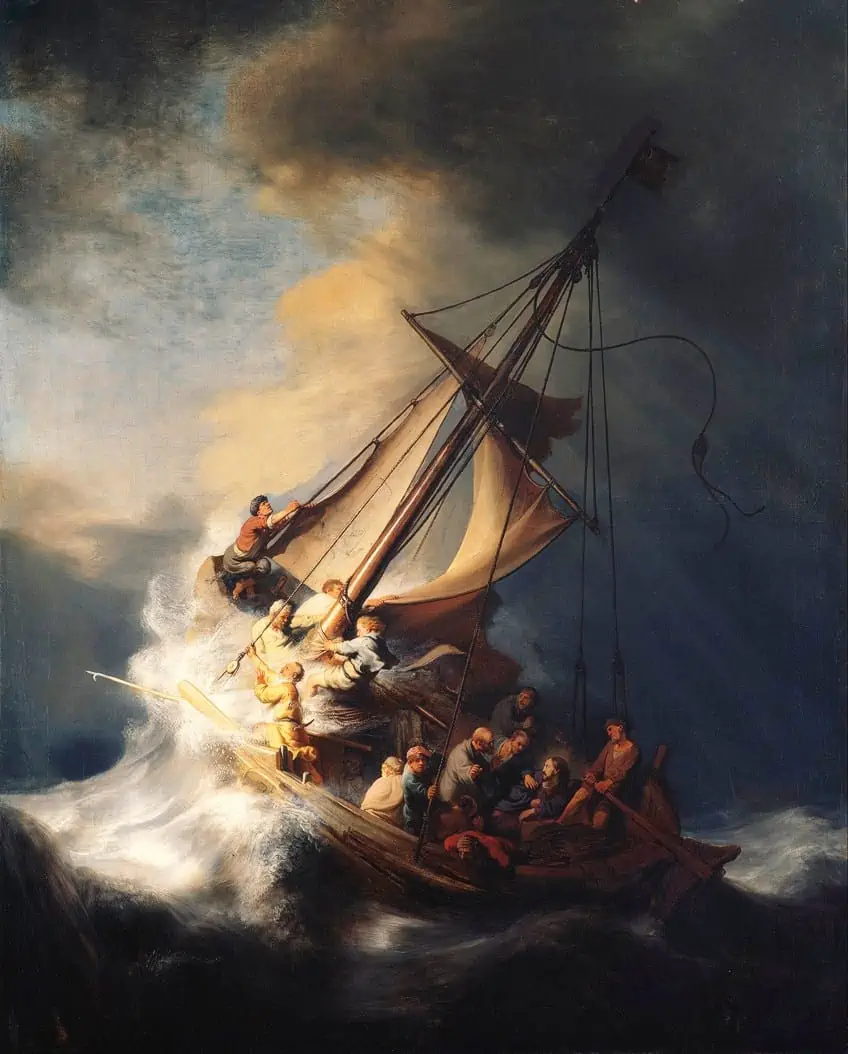
The other travelers on the vessel are primarily worried about the storm and the security of the ship, however, only Jesus believes in the power of illumination and can stay calm in the middle of it. The apostles at Jesus’ feet are lured to the brightness and even consider touching him. The followers may be lured to the light as well.
One of Rembrandt’s best-known paintings, the storm, is a powerful representation of Christ’s death and passion, as well as the power of the ocean.
The Monk by the Sea (1810) by Caspar David Friedrich
| Artist | Caspar David Friedrich (1774 – 1840) |
| Date of Completion | 1810 |
| Medium | Oil on canvas |
| Dimensions (cm) | 110 × 171.5 |
| Current Location | Alte Nationalgalerie, Berlin, Germany |
The sea often seems to merge into the sky, and the horizon is obscured by fog or clouds. Caspar David Friedrich’s picture depicts this type of atmosphere perfectly in this famous ocean artwork, emphasizing the majesty of both God and nature.
This work was created about 1810 and is considered one of the most notable German paintings of the time.
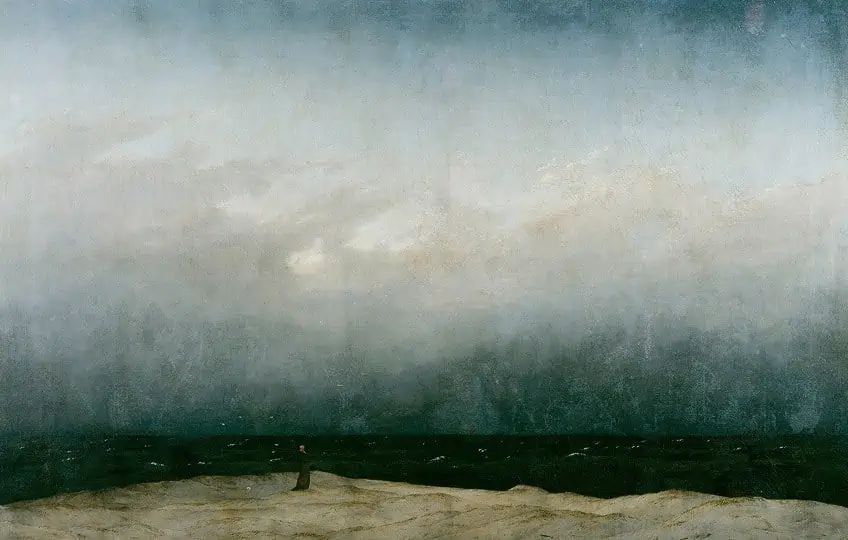
The picture depicts a solitary monk walking on the beach, gazing out into the unending ocean waves in front of him. The sky takes up the majority of the painting, with barely a sliver of the land and water below visible. This is considered to represent the almighty’s unfathomable essence, despite our limited, finite intellect.
The Raft of the Medusa (1819) by Théodore Géricault
| Artist | Théodore Géricault (1791 – 1824) |
| Date of Completion | 1819 |
| Medium | Oil on canvas |
| Dimensions (m) | 4,91 x 7,16 |
| Current Location | Louvre Museum, Paris, France |
This is one of the most famous paintings of the ocean to come from France, completed in 1819. It is among the most renowned French Romanticism artworks in history, depicting a dramatic shipwreck off the Senegalese coast in 1816.
Prior to actually putting brush to canvas, the ocean painter thoroughly researched the situation and spent a long time pondering how he would depict the dismal reality of being stranded at sea.
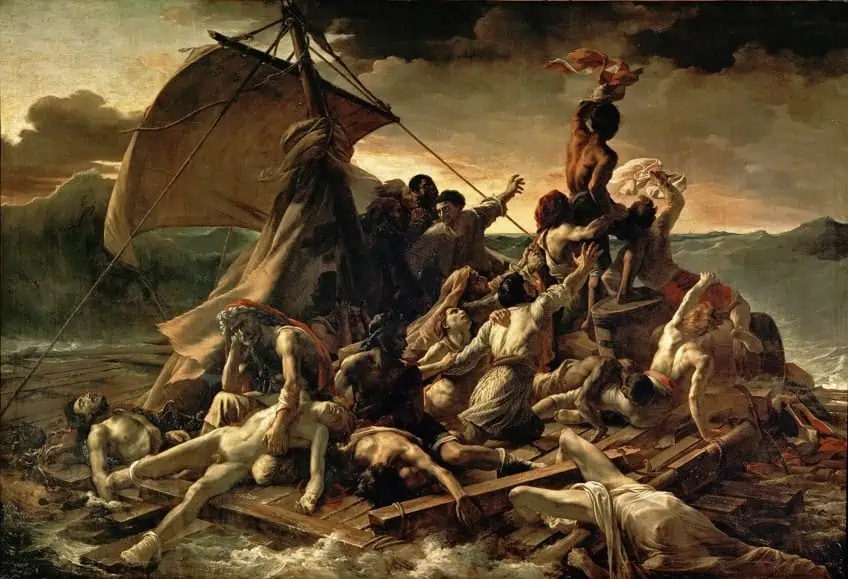
Géricault created a scenario that depicted a more cheerful attitude than what is recorded of the catastrophe, drawing its inspiration from two survivors of the disaster. The passengers of the French Royal Navy ship described the fighting among the survivors and eventually resorting to cannibalism.
This picture is about the optimistic but desperate feeling of being stranded at sea.
The Great Wave off Kanagawa (1831) by Katsushika Hokusai
| Artist | Katsushika Hokusai (1760 – 1849) |
| Date of Completion | 1831 |
| Medium | Ink |
| Dimensions (cm) | 26 x 38 |
| Current Location | The Art Institute of Chicago, Chicago, USA |
Hokusai created this famous ocean artwork in the form of a sequence of scenes titled Thirty-Six Views of Mount Fuji. This was the most renowned artwork since it represented the seas surrounding Mount Fuji in all its notoriously uncontrollable rage, which instilled many sailors with dread at having to travel near this location.
Hokusai opted to create the painting in a visceral blue hue that emphasizes the massive, raging waves surging and smashing.
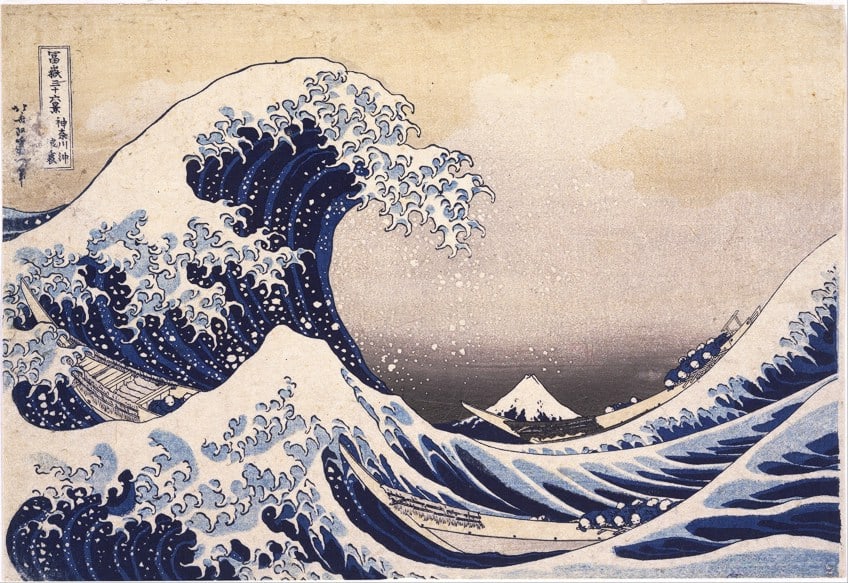
Mount Fuji may be seen as a little, distant landscape at the peak of the biggest wave, scarcely distinguishable from the majority of the ocean’s waves. The ocean painter also incorporated ships that are overwhelmed by the massive waves that surround them.
The boat in the artwork’s center seems to be on the point of getting engulfed by an impending rogue wave.
The Ninth Wave (1850) by Ivan Aivazovsky
| Artist | Ivan Aivazovsky (1817 – 1900) |
| Date of Completion | 1850 |
| Medium | Oil on canvas |
| Dimensions (m) | 2,21 x 3,32 |
| Current Location | The State Russian Museum, Mikhailovsky Palace, Russia |
Ivan Aivazovsky was entranced by the power of the ocean, not experiencing fear even in the most dangerous situations. When a ship was caught in a horrible storm, some said that everyone on board died. Fortunately, the ship arrived at a port, but the memories of the storm lasted with Aivazovsky and served as the inspiration for many of his paintings of the ocean.
The bulk of Aivazovsky’s works portrays violent storms and shipwrecks.
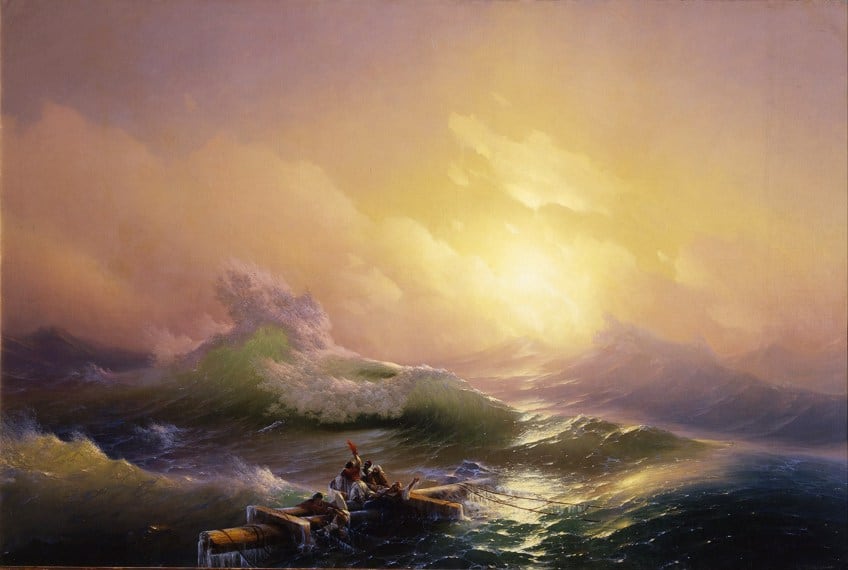
In his paintings of the sea, he demonstrates nature’s unstoppable might while people are lost beneath the waves and cannot fight back. In the famous ocean artwork, people can be seen clinging to a bent mast in a frantic search for survival.
The sun’s rays filtering through the clouds give a momentary break from the gloom.
The Icebergs (1861) by Frederic Edwin Church
| Artist | Frederic Edwin Church (1826 – 1900) |
| Date of Completion | 1861 |
| Medium | Oil on canvas |
| Dimensions (m) | 1,64 x 2,86 |
| Current Location | Dallas Museum of Art, Dallas, USA |
This is an excellent example of Frederic Edwin Church’s technical ability and astute marketing. The icebergs’ seductively appealing hues, brilliant subsurface light, and shiny, tactile surfaces draw the viewer’s attention. However, as the shattered mast in the foreground suggests, the landscape is an unfriendly and dangerous location.
Church chartered a month-long expedition in the North Atlantic, off the coastlines of Labrador and Newfoundland, in 1859.
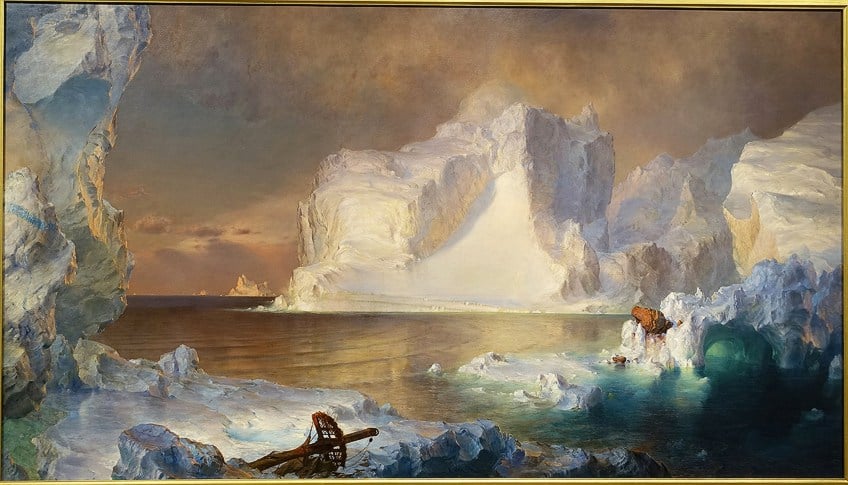
He spent many weeks aboard a 65-ton schooner and a tiny rowboat, navigating dangerous waters and intensively studying the shapes and colors of icebergs in the Arctic region. The picture became famous within Church’s output and influenced other outdoor artists’ interest in the Arctic, although some viewers were baffled by its seeming lack of story or metaphor.
Gloucester Harbor (1879) by Mary Blood Mellen
| Artist | Mary Blood Mellen (1819 – 1886) |
| Date of Completion | 1879 |
| Medium | Oil on canvas |
| Dimensions (cm) | 53.66 x 79.06 |
| Current Location | Bowdoin College Museum of Art, Maine, USA |
Mary Blood Mellen was an artist from America who was a member of the Hudson River School, a landscape painting style in the mid-19th century. Fitz Henry Lane, her mentor, and friend was known to mimic her art. This has served to overshadow her skill as an artist. Her artworks frequently included landscapes and oceanic scenes.
Though she resided in Connecticut and New York, she spent most of her time in Massachusetts, and many of her works are inspired by the seascapes and landscapes of Maine and Massachusetts.
In this beautiful artwork by Mary Blood Mellen, two-thirds of the paintings are taken up by the sky, with the lower third featuring a large ship on the left and a small fishing boat on the right. The sun can be seen setting on the horizon to the right.
Impression, Sunrise (1881) by Claude Monet
| Artist | Claude Monet (1840 – 1926) |
| Date of Completion | 1881 |
| Medium | Oil on canvas |
| Dimensions (cm) | 48 x 63 |
| Current Location | Musée Marmottan Monet, Paris, France |
This famous piece of art by Claude Monet was made in 1881 and has an instantly recognizable atmosphere and style. Despite standing against the grey background, the sun’s orange color is not more noticeable than other hues. The dawn is hardly undetectable in this image when contrasted with the surrounding scenery.
One of the primary factors contributing to this painting’s unsettling feel is the contrast between color and brightness.
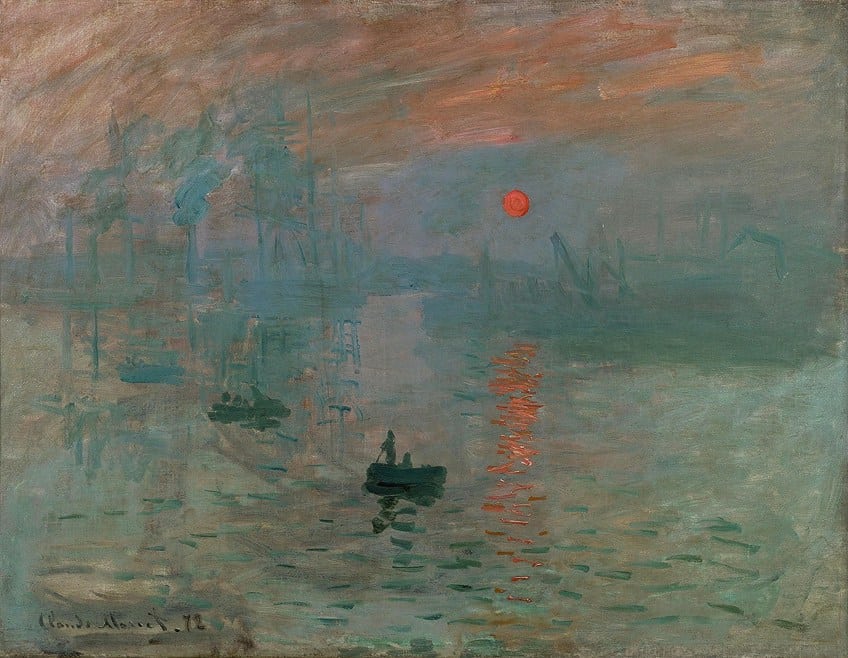
The topic exhibits a variety of cultural influences. Landscape artworks with sunrises and French ports were common during the 19th century. Part of Monet’s topic selection is influenced by his own experiences. He had ties to the port because Le Havre was where he was born and raised.
Fisherman’s Wife Coming to Bathe Her Children (1881) by Virginie Demont-Breton
| Artist | Virginie Demont-Breton (1859 – 1935) |
| Date of Completion | 1881 |
| Medium | Oil on canvas |
| Dimensions (cm) | 203.2 x 126.4 |
| Current Location | Sotheby’s Auction House, New York, USA |
Virginie Demont-Breton was a painter from France. Her father was also an artist and exposed her to other artists, the most prominent of which was Rosa Bonheur, who became a mentor and role model to the young artist. Her creative career began at a young age due to familial links to artists, and she completed her first picture at the age of 14.
She began showing at the Salon at the age of 20 when she garnered Honorable Mentions.
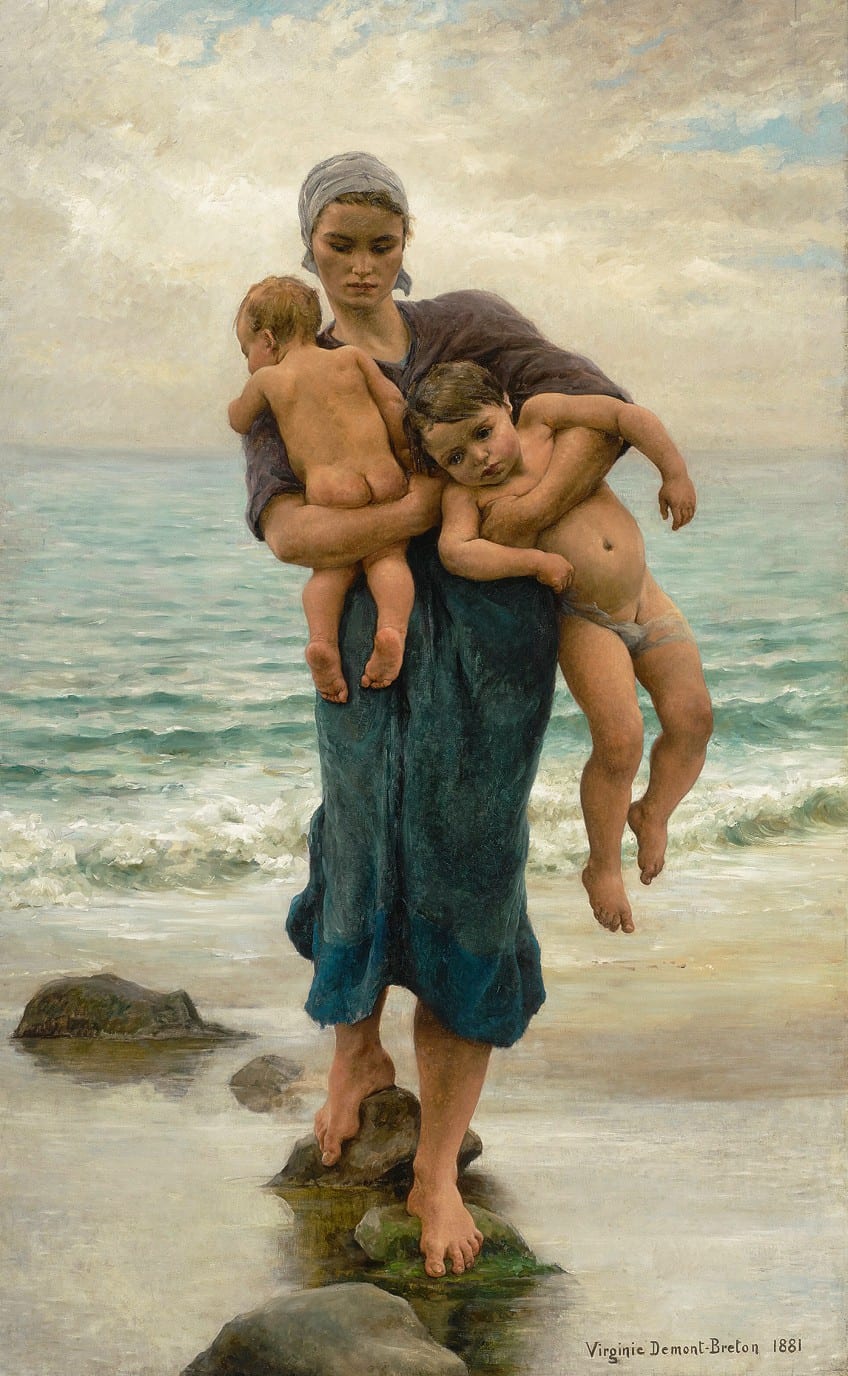
She used to create portraits and historical subjects, but after relocating to Wissant, she began depicting fishermen and their families in a more realistic approach. This painting portrays a fisherman’s wife bringing the children in from the ocean to bathe them.
The Gulf Stream (1899) by Winslow Homer
| Artist | Winslow Homer (1836 – 1910) |
| Date of Completion | 1899 |
| Medium | Oil on canvas |
| Dimensions (cm) | 71.5 x 124 |
| Current Location | The Metropolitan Museum of Art, New York, USA |
This famous ocean artwork by Winslow Homer depicts the scenic yet dangerous aspects of maritime journeys. The 1899 picture portrays a lone sailor inside a rudderless boat drifting in the water currents surrounded by a swarm of voracious sharks.
The artwork serves as a somber warning that life at sea is fraught with danger at all times, yet many art experts and lovers have long admired it for its symbolism and intricacy.
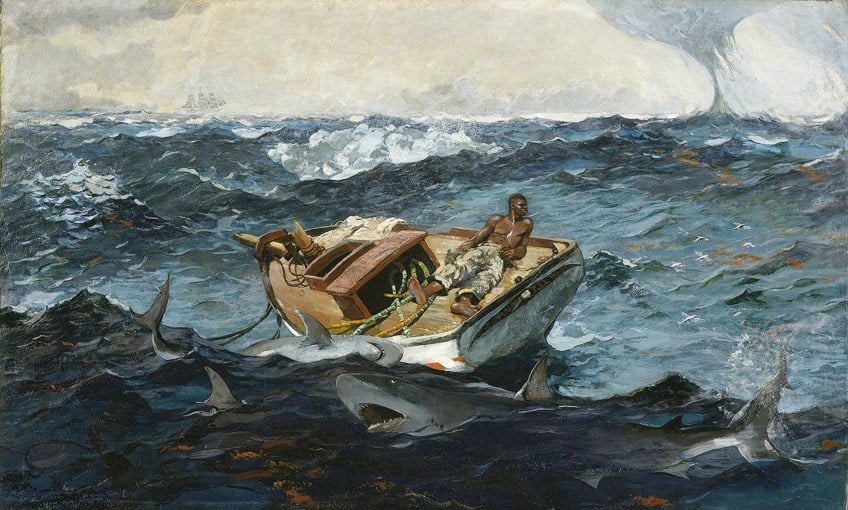
The person on the boat is traveling along the Gulf Stream, a powerful Atlantic current attributed by many sailors with transporting ships to and from specific parts of the Caribbean. The man seems to be completely lost, oblivious of the ship traveling miles away to the left of the image, with just a few stems of sugarcane to nourish him.
Has our list of famous ocean paintings perhaps made you want to become an ocean painter yourself? Paintings of the sea offer artists the chance to portray the many sides of the ocean – from its calm and tranquil moments to the dramatically intense moments of raw fury. While some ocean painters have focused on the seascape itself, others have portrayed events that occurred in the ocean, such as ships being stranded and wars.
Take a look at our famous paintings of the ocean webstory here!
Frequently Asked Questions
Why Do Artists Portray the Ocean?
Nature has always been a favorite subject of artists. This includes landscapes as well as seascapes. The undulating waves, reflective surfaces, and abundance of colors enable artists to perfect their skills at portraying the beautiful sea. They can incorporate the cool palette in the ocean, and the warm palette in the glowing sunset skies.
What Is Regarded as the Most Famous Ocean Artwork?
Many people regard The Great Wave off Kanagawa to be the best ocean painting. It was created by Katsushika Hokusai in 1831. It features a massive wave swallowing a boat with Mount Fuji in the background.
Jordan Anthony is a Cape Town-based film photographer, curator, and arts writer. She holds a Bachelor of Art in Fine Arts from the University of the Witwatersrand, Johannesburg, where she explored themes like healing, identity, dreams, and intuitive creation in her Contemporary art practice. Jordan has collaborated with various local art institutions, including the KZNSA Gallery in Durban, the Turbine Art Fair, and the Wits Art Museum. Her photography focuses on abstract color manipulations, portraiture, candid shots, and urban landscapes. She’s intrigued by philosophy, memory, and esotericism, drawing inspiration from Surrealism, Fluxus, and ancient civilizations, as well as childhood influences and found objects. Jordan is working for artfilemagazine since 2022 and writes blog posts about art history and photography.
Learn more about Jordan Anthony and about us.
Cite this Article
Jordan, Anthony, “Famous Ocean Paintings – Discover Iconic Paintings of the Sea.” artfilemagazine – Your Online Art Source. December 22, 2022. URL: https://artfilemagazine.com/famous-ocean-paintings/
Anthony, J. (2022, 22 December). Famous Ocean Paintings – Discover Iconic Paintings of the Sea. artfilemagazine – Your Online Art Source. https://artfilemagazine.com/famous-ocean-paintings/
Anthony, Jordan. “Famous Ocean Paintings – Discover Iconic Paintings of the Sea.” artfilemagazine – Your Online Art Source, December 22, 2022. https://artfilemagazine.com/famous-ocean-paintings/.


